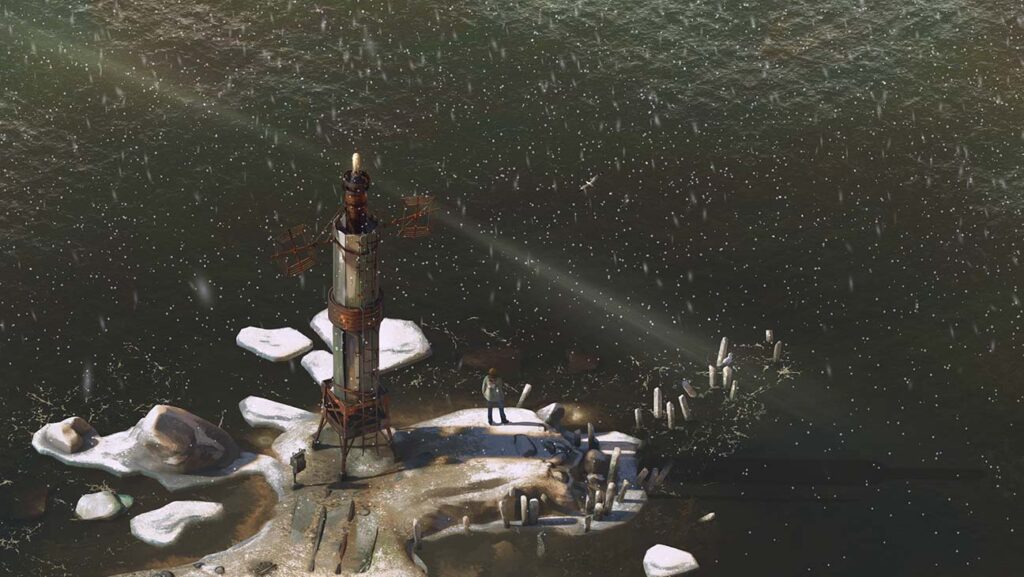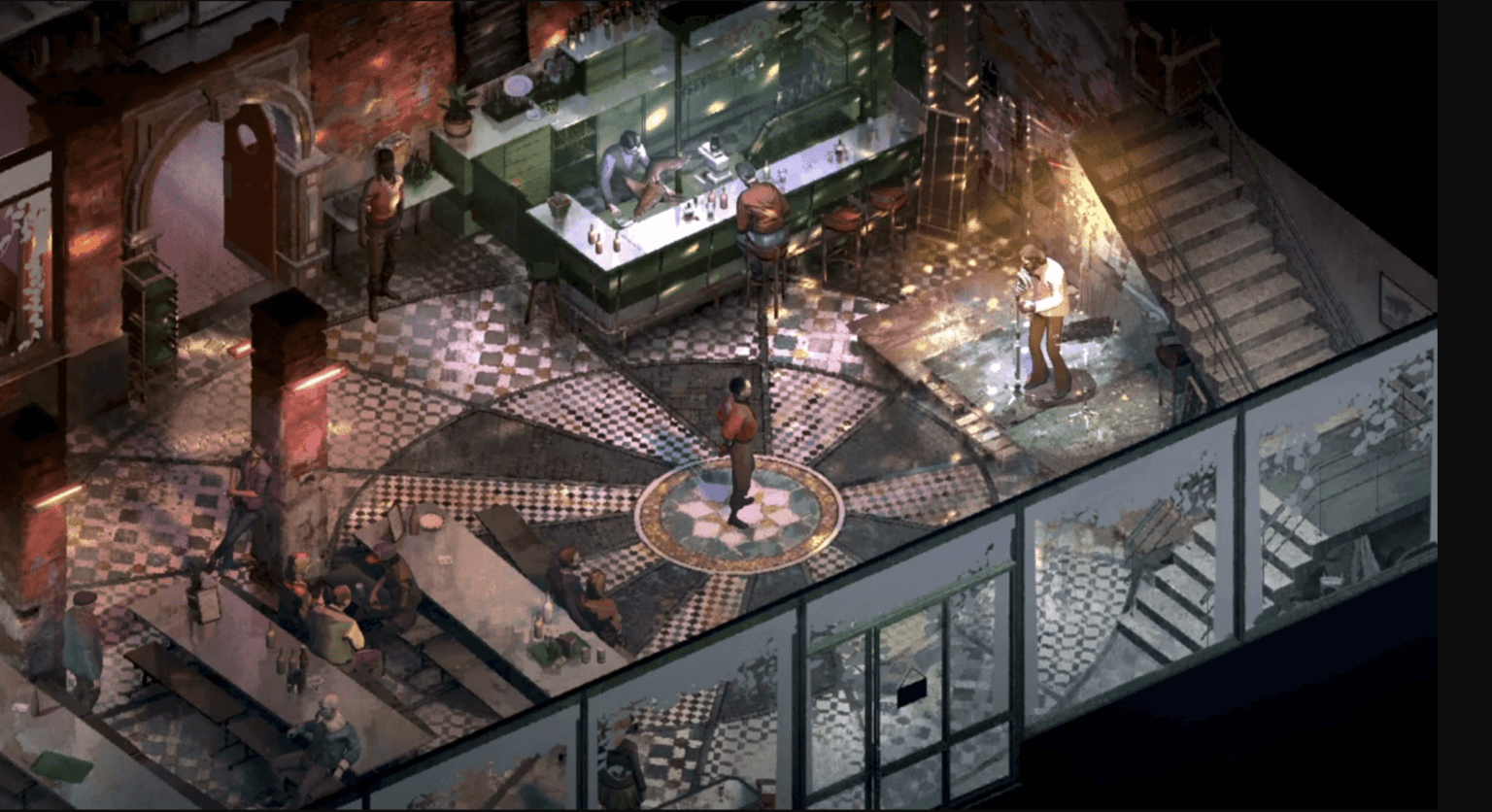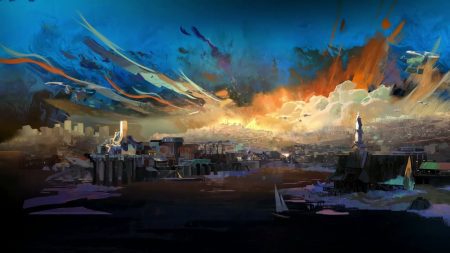The city of Revachol is bleeding. Whether its citizens know it or not, the city is a suppurating wound left behind from when its revolution was destroyed. The events of Disco Elysium take place within living memory of the Revolution, and in many ways, protagonist Harry Du Bois embodies the city. A politically-confused amnesiac, desperately searching for meaning in the wreckage of his life, just as Revachol’s different ideologies butt against each other, sifting through the deaths of royalty and endless conflict for an icon, something to hold onto.
The choice of what Harry eventually holds on to is left to the player, but the search for meaning would be far less, well, meaningful, if it wasn’t for the game’s incredible soundtrack. Scored by the British indie band Sea Power, it is redolent with sadness, hope, security and destruction in equal measure, capturing the emotional state of both Harry and Revachol at large.
It would take a huge number of words to look at every track in the game. In this article, we’ll look at three songs from three momentous moments in the game. First off, let’s take a look at the music you hear when stepping into Revachol for the first time.
Editors’ Note: We think this essay is largely spoiler-free for Disco Elysium.
Instrument of Surrender
In the streets, Sea Power’s “Instrument of Surrender” booms out at you. The song’s echoing trumpets and mournful strings reflect the city’s total destruction at the hands of the Coalition of Nations. Like the Biblical Walls of Jericho, a mighty trumpet blasted and Revachol fell, its revolution with it. The pockmarked streets are the external echo of Harry’s self-destruction, a man who had love and hope once, long ago.
The song is a reworking of a previously released Sea Power song, “Red Rock Riviera,” made for the soundtrack of the documentary From the Sea to the Land Beyond.
Despite all of the horrors that both Harry and the City have endured, the song ends on a hopeful note, with a motif from Sea Power’s song “Cleaning Out the Rooms,” which contains the lyric: “I’ll wake up in a new life, down by the seaside.” We have the power to grant, or not grant, Harry that new life.
In granting it through the vast selection of quests and actions available to them, the player may be able to produce knock-on effects that will help to heal the city.

Whirling-In-Rags
Okay, I am cheating a bit with the three-song limit—“Whirling-In-Rags” has three variations on the same theme, and they’re all worth examining.
The first variation that the player hears is “Whirling-In-Rags, 8 AM.” A pretty upbeat tune that you’ll hum for hours, the song offers some refuge from the streets’ booming trumpets, just as the bar offers Harry refuge from the horrors of the world, murder, and what became of his identity. Amid the chaos, the hotel lobby of Whirling-In-Rags is an oasis of calm, aside from any carnage caused by Harry the night before.
Later, we come to “Whirling-In-Rags 12 PM.” It’s time to pay the piper. The player has seen the hopelessness of it all, the sheer desperation of the city and Harry. The theme enters a minor key, shifting from poppy instrumentation to focus on a reverb-heavy piano melody. While the Whirling-In-Rags remains a sanctuary, it cannot compete with the darkness that lurks beneath the surface, now bubbling to the mind’s forefront. It’s a variation reminiscent of hangxiety, of indiscretions coming to light and the sadness of the day after.
Finally, we come to “Whirling-In-Rags, 8 PM.” After such a dark song at midday, you may be surprised to hear such an upbeat variation at 8 PM. The piano is replaced by a more energetic, electronic variation on the theme. It’s far closer to the 8 AM version. Why? The night is Harry’s time.
A man with addiction issues, Harry is a creature of the night, a time when he can be drunk or high without being alone in his altered state. Others might join him, and he’s able to blend into the bar room of the Whirling-In-Rags. At 8 AM, Harry is likely still drunk, giving him the afterglow before the stark relief of midday. The Whirling-In-Rags is at its most lively in the evening too, lending external reinforcement to the song’s joie de vivre.
Burn, Baby, Burn
Late in the game, when sailing to an islet in Revachol’s bay, you have the option to blast out the in-game radio station appropriately titled Sad FM. If you do, you’ll hear the song “Burn, Baby, Burn,” a reworking of Sea Power’s song “Want to Be Free,” interspersed with a couplet from the 1976 hit “Disco Inferno.” These two make odd bedfellows at first – think of the pizzazz of The Trammps’ song, compared to the slow and sad melody provided by Sea Power’s instrumentation and vocals.
Yet, it makes perfect sense for both Revachol and Harry. For the city, its revolutionaries wanted, more than anything, to be free. Yet this opportunity was crushed by the Coalition, leaving Revachol in its current state. The blaze of shelling not only crushed the city but its citizenry, too, leaving them in the grip of the very forces that they fought against.
On a more personal level, Harry finds himself amid an inferno caused by his own lifestyle, but he wants—at least, can want, depending on your playstyle—to be free. Free from his addictions, free from the case, or free from himself. Blasting Sad FM is a way to be free, if only for a few moments.

A Soundtrack Hopeful and Hopeless
Disco Elysium is a game that can easily be read as depressing. The protagonist is a wreck, unloved and filled with self-hatred. The world is at odds with itself, still bearing the scars of the last time the outside world deigned to strike it down.
Yet, to me, Disco Elysium is far more hopeful than it is morose. The potential of Harry is plain for all to see—he’s an incredible detective, artistic, and can be truly compassionate. The city has potential, too, even if it’s in a bad state during the game’s events. There is an appetite to make it better, and the player can be an agent of change. Perhaps that’s why, in the midst of songs in the minor key, the soundtrack isn’t afraid of a rare upbeat bop.
Let’s close with a quote from the game that applies equally to both Harry and his environs:
“This is somewhere to be. This is all you have, but it’s still something. Streets and sodium lights. The sky, the world. You’re still alive.”
Joe is a games critic and English literature graduate who knows far too much about video games and critical theory. He once wrote a Derridean reading of the animal masks in Hotline Miami. You can find him on Twitter @jchiverswriter.











